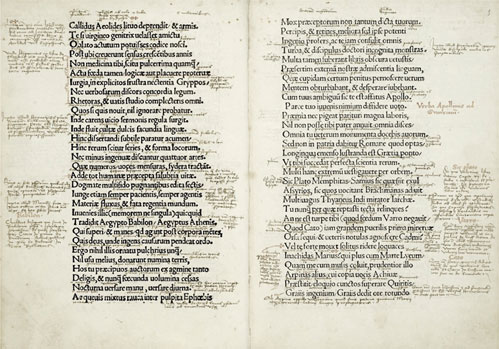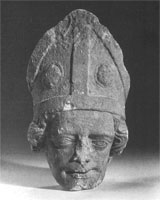While poetry, in general, basked in the dusk around the globe, the figure of another poet comes to mind alongside Villon, and this is the Hungarian Janus Pannonius. Janus Pannonius could have been the younger brother of the Frenchman who led such a hectic life. He was born only three years after Villon in a region of Hungary destroyed during the Ottoman occupation and which today is part of Croatia. Both men grew up without fathers, and while Villon was raised by an Abbot, Janus was brought up by his elder brother, a priest. He was educated in Ferrara and Padua, not too far geographically from Paris, where Villon studied, becoming a magister artium. Janus earned the title legum doctor before he returned to Hungary. Along the way, Andrea Mantegna fashioned a portrait of the poet and perhaps the likeness of the youth, who had already earned a high position in the Church, was also preserved in a fresco by the artist. Only a few years before, as a rambunctious teenager, Janus Pannonius wrote poetry with reckless abandon, using language that would even have made Villon blush. (I believe that they would have both laughed at these provocative creations, as I am sure the two would have gotten along very well.) In his early twenties, Janus became a leading figure among the Italian humanists, whose intelligence, elegance, talent and erudition cast a spell on those around them. Arriving back in Hungary, he became a trusted advisor to Matthias Corvinus, one of the greatest renaissance monarchs of the age. It was due to Matthias that he became not only a bishop in his twenties, with special Papal permission, but also one of the leaders of the country, a true dignitary of state. Only his Latin poems survived, as at the time this was the language of the educated. His poetry is informed by the masterful synthesis of antique pattern, modern message and universal content. He is often mentioned in the company of the greatest ancient Latin poets; what is certain is that he was the last important poet to use the language. (Since then, Hungary has given Europe several significant Latin writers, for example Stephanus Parmenius Budaeus, the chronicler of the New World explorer Sir Roger Hakluyt. A. A. Milne’s Winnie the Pooh was also translated into Latin by a Hungarian.)

At different times many wanted to burn Villon at the stake, while others wanted to send him to the gallows. At the age of 32 he disappears from sight into the mist of history. Janus, at the end of his short life, became embroiled in the intrigue of politics. Like Villon, he learned what it is like to come to terms with one’s life in the shadow of death. A few years after Villon left Paris and set out on a journey, perhaps heading east, the ailing Bishop fled west to escape the wrath of his King. They could easily have come across each another somewhere in the south, had Janus Pannonius not passed away in Medvevár (“Bear Castle”), a town not far from his birthplace. Then, in that moment, perhaps those words crossed his mind which can be found not far from Pécs (in Latin, Quinquecclesiae), his episcopal seat. The words, engraved on a surviving Roman gravestone which mark the resting spot of a great actor read, “he died many times, but never like this!” Janus Pannonius is now buried in the Cathedral of Pécs. But readers of Jorge Luis Borges can come across “Janos of Pannonia”, a theologian, in a novel, and Borges wrote an unforgettable poem as well, with the title “About the First Hungarian Poet”. I want to finish my introduction by quoting some lines from this poem.



